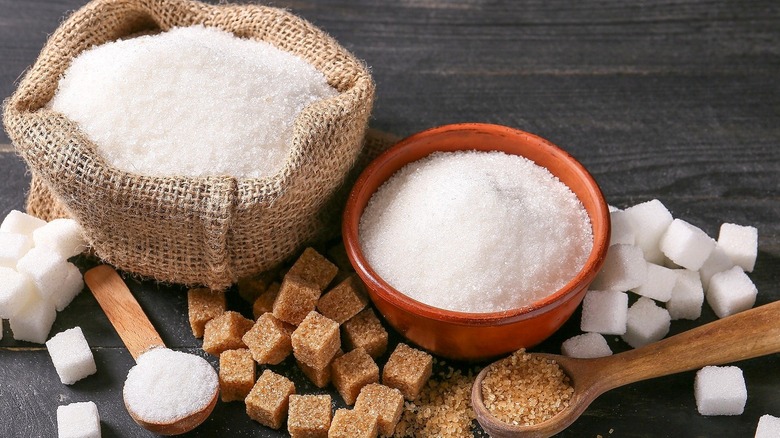These Foods Are Worse For You Than Sugar
If you enjoy the occasional splurge on a fudgy chocolate cake or a basket of french fries, there could be more to consider than just the empty calories you're consuming in sugar. You've probably heard that eating too much sugar isn't great for you. But how much do you know about saturated fat, the ruler of all tasty foods meat and dairy-related?
"Consistent intake of sugar is a sure negative because many foods that are high in added sugars are also low in nutrients. However, saturated fat and sodium rank high on the list with sugar," explains Amy Goodson, MS, RD, CSSD, LD. "Saturated fat is found in fried foods as well as other foods made with butters, cream, and lard. Drive through any drive-thru, and you can pretty much ensure you are eating saturated fat."
Consuming too much saturated fat has been shown to suggest an early onset of heart disease and other potential illnesses, according to Healthline. You may not realize that some of your most beloved snacks fall into the unhealthy pool due to their high saturated fat content. If you're a lover of ice cream and processed meats such as bacon (who isn't?), then you may want to consider an alternative for your health's sake.
Hefty consumption of saturated fats has been linked to increased cholesterol levels and certain diseases regarding circulation (per The British Heart Foundation). Still, Healthline suggests further research is needed to determine the exact effect these fats have on the human body.
Look out for saturated fat and sodium
Now that you're imagining your life with fewer hot dogs, it's time to lower the boom and uncover the dangers of eating too much sodium. Salt is something humans need to survive; the problem is that we're getting way more than we need on a daily basis. The average person consumes more than three grams of sodium per day, which is 18 times more than the recommended amount (per The Harvard School of Public Health).
"Sodium can also contribute to increases in blood pressure, says Amy Goodson, MS, RD, CSSD, LD. "It makes food taste better and prolongs shelf life but long-term can have negative impacts on health."
If you eat out often or buy packaged foods such as chips, your chances of eating hidden sodium are higher, per the FDA. "Chips contain both saturated fat and sodium, which ultimately can contribute to increases in cholesterol and blood pressure if you consume them regularly," Goodson says. "Also, typically chips are not high in nutrients, so while it's not to say you can't ever eat them, they should be consumed less often. Plus, they also add calories. A serving of chips (typically 8-12, depending on the brand) is around 140 calories."
While this may come as bad news, it's easy to add in some better-for-you alternatives for the sake of your health. According to the University of California San Francisco, cooking at home can save you from loading up on sodium and unwanted fats.

